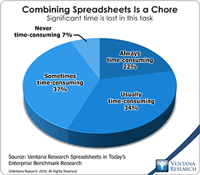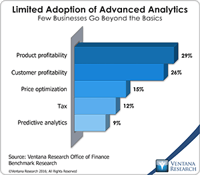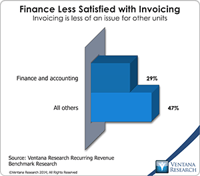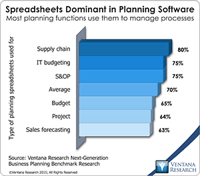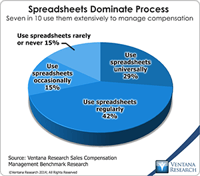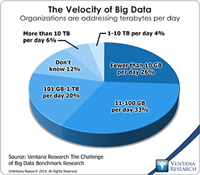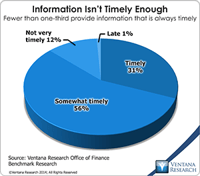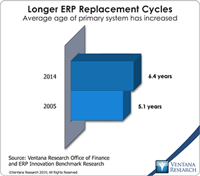One of the oddities of corporate management is that, as a rule, nobody oversees managing profitability. CEOs are accountable for meeting company-wide financial targets and assign responsibility for achieving profitability levels to business unit owners across and down an organization. Sales quotas designed to achieve revenue goals are put in place, and budget owners have cost and margin objectives. But setting profitability objectives is not the same as managing profitability.
Read More
Topics:
Office of Finance,
Sales Performance Management (SPM),
Financial Performance Management,
Price and Revenue Management,
Digital Commerce,
Predictive Planning,
Subscription Management
Ventana Research coined the term “enterprise spreadsheet” in 2004 to describe a variety of software applications that add a desktop spreadsheet’s user interface (usually that of Microsoft Excel) to components that address the issues that arise when desktop spreadsheets are used in repetitive, collaborative enterprise processes. Enterprise spreadsheets are designed to provide the best of both worlds in that they offer the ease of use and flexibility of desktop spreadsheets while overcoming their...
Read More
Topics:
Operational Performance Management (OPM),
Analytics,
Business Analytics,
Business Intelligence,
Uncategorized,
Business Performance Management (BPM),
Customer Performance Management (CPM),
Financial Performance Management (FPM),
Information Management (IM),
Sales Performance Management (SPM),
Supply Chain Performance Management (SCPM)
Vendavo is a vendor of business-to-business (B2B) price and revenue optimization software, which I have written about. A major focus of the conference sessions this year at the company’s annual user group meeting was on practical approaches to successful price optimization initiatives. While this category of software has been achieving increasing acceptance, penetration is still limited in the B2B segment, which includes, for example, industrial goods and services.
Read More
Topics:
Big Data,
Operational Performance Management (OPM),
Business Analytics,
Business Performance Management (BPM),
Customer Performance Management (CPM),
Financial Performance Management (FPM),
Sales Performance Management (SPM),
Vendavo, price, pricing, optimization, revenue, cu
Invoicing and billing are mundane business activities that hardly anyone outside of the accounting department cares about, but they are where the back office meets the front office. How well a company handles the process of getting paid by its customers can have an impact on its relationships with them. Like most of the details of business process execution, the impact of substandard invoicing and billing is rarely obvious or even of interest to senior management. That said, like trimming scrap...
Read More
Topics:
Office of Finance,
Cloud Computing,
Business Performance Management (BPM),
Customer Performance Management (CPM),
Financial Performance Management (FPM),
Sales Performance Management (SPM)
The blockchain distributed database was invented to create the peer-to-peer digital cash called bitcoin in 2008. Although the future potential of bitcoin and other cryptocurrencies has been debated, the distributed ledger structure using a blockchain database that supports bitcoin is likely to be adopted for a range of commercial and governmental purposes. Distributed ledgers are a secure and transparent way to digitally track the ownership of assets while enabling faster transaction speeds and...
Read More
Topics:
Office of Finance,
Operational Performance Management (OPM),
Uncategorized,
Business Performance Management (BPM),
Customer Performance Management (CPM),
Financial Performance Management (FPM),
Sales Performance Management (SPM),
Supply Chain Performance Management (SCPM),
blockchain, distributed ledger, DLT, ERP, SCM, sup
I recently wrote about the challenge some companies will face in planning and budgeting when new revenue recognition rules go into effect in most countries in 2018. It’s important for companies that will be affected to be sure they have the appropriate systems, processes and training to handle the more difficult demands imposed by the new rules. With the change in accounting, the time lag between when a contract is signed and when a company recognizes revenue from it may be more variable and...
Read More
Topics:
Big Data,
Uncategorized,
Business Performance Management (BPM),
Financial Performance Management (FPM),
Sales Performance Management (SPM)
New standards governing accounting for contracts will go into effect for most companies in 2018. The Financial Accounting Standards Board (FASB), which administers Generally Accepted Accounting Principles in the U.S. (US-GAAP), has issued ASC 606, and the International Accounting Standards Board (IASB), which administers International Financial Reporting Standards (IFRS) used in most other countries, has issued IFRS 15. The two are very similar, and both will enforce fundamental changes in this...
Read More
Topics:
Sales,
Uncategorized,
Business Performance Management (BPM),
Financial Performance Management (FPM),
Sales Performance Management (SPM)
Information technology enables a data-driven management style that was not feasible until powerful, affordable computers became generally available. There’s no bright line marking when this became possible; the process is ongoing. People were using financial analytics long before ENIAC, the first general-purpose computer, appeared, but the metrics available were not especially timely, broadly applicable to day-to-day situations or comprehensive enough to inform most management decision-making....
Read More
Topics:
Big Data,
Office of Finance,
Operational Performance Management (OPM),
Business Analytics,
Uncategorized,
Business Performance Management (BPM),
Customer Performance Management (CPM),
Financial Performance Management (FPM),
Sales Performance Management (SPM)
There were two noteworthy themes in SAP CEO Bill McDermott’s keynote at this year’s Sapphire conference. One was customer assurance; that is, placing greater emphasis on making the implementation of even complex business software more predictable and less of an effort. This theme reflects the maturing of the enterprise applications business as it transitions from producing highly customized software to providing configurable, off-the-rack purchases. Implementing ERP will never be simple, as I...
Read More
Topics:
Predictive Analytics,
SAP,
Operational Performance Management (OPM),
Uncategorized,
Business Performance Management (BPM),
Customer Performance Management (CPM),
Financial Performance Management (FPM),
Sales Performance Management (SPM),
Supply Chain Performance Management (SCPM)
Infor recently held its annual Innovation Summit at its New York City headquarters. The company has shown leadership and creativity in business applications on two fronts: focusing its development efforts on enhancing the user experience and collaboration and building an application architecture that will deliver a rich set of functionality for ERP, financial management, CRM and HRMS and business analytics in a multitenant cloud environment. All of these advances were necessary to remake a...
Read More
Topics:
Mobile Technology,
Operational Performance Management (OPM),
accounting, analytics, ERP, EAM, CRM, HCM, innovat,
Human Capital,
Business Analytics,
Cloud Computing,
Uncategorized,
Business Performance Management (BPM),
Customer Performance Management (CPM),
Financial Performance Management (FPM),
Sales Performance Management (SPM),
Supply Chain Performance Management (SCPM)



